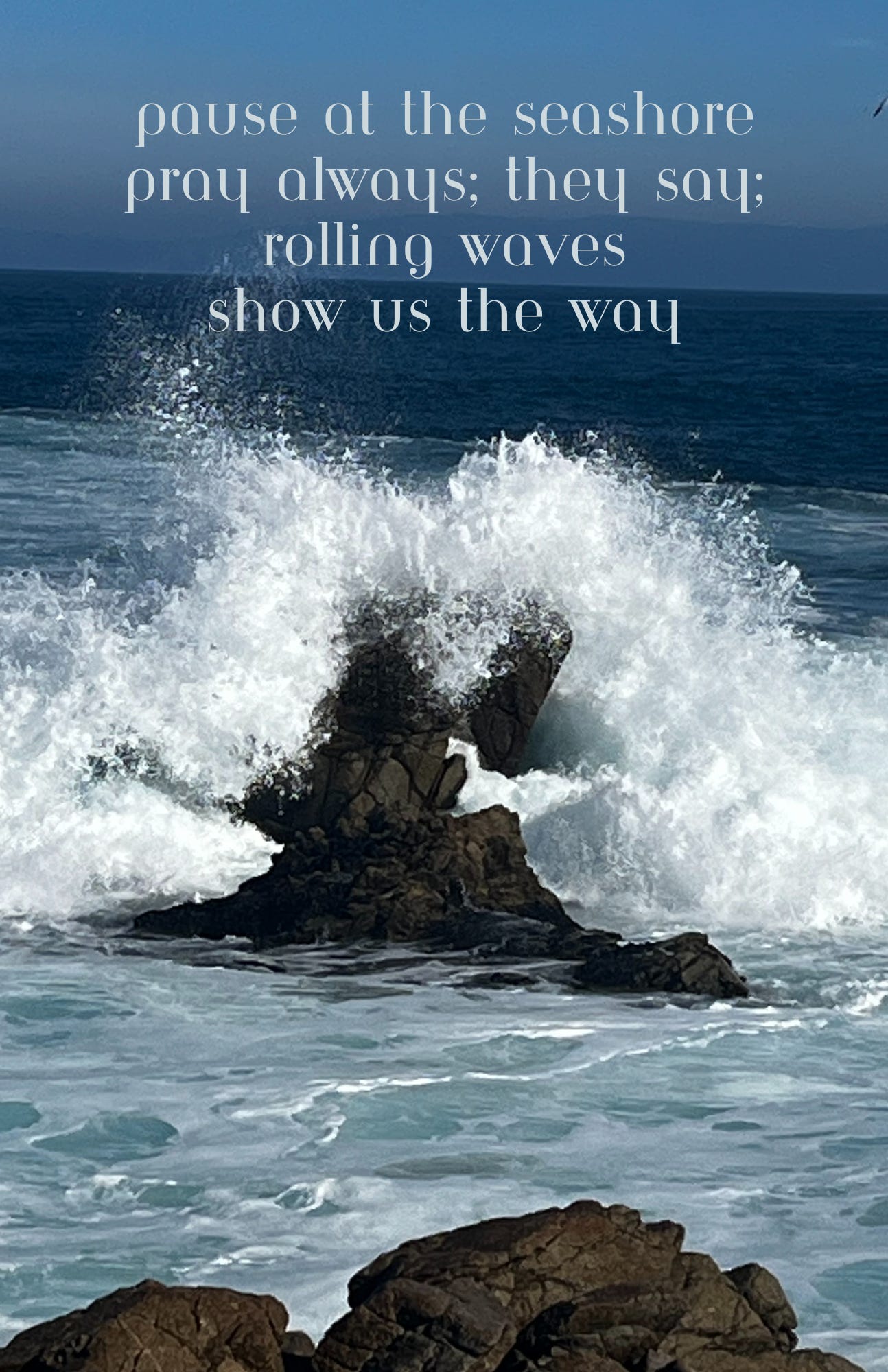A few weeks ago, one of my closest friends and I met in Monterey, California, for a few days. We savored the ocean breeze, made a list of all the birds we saw, drove the famed 17-mile-drive (twice!!), found beaches with Sea Otters, sat in Adirondack chairs with our feet in a freezing river in Big Sur, explored Missions and Catholic Cathedrals and, of course, found yummy food.
As my plane lifted from San Francisco, I felt grateful for the experience. I did what seemed right. I reflected on my time away through haiku poetry.
I started writing haiku almost five years ago at the invitation of Michael Kroth. (Learn more about his work, books, and poetry at Profound Living.) Over the years, my haiku practice waxes and wanes. However, the lessons from the practice of haiku have changed me.
Isn’t that the power and magic of a regular practice? Small, daily, weekly, and monthly repetitions reshape and reorient life.
I like to think of the practice of writing haiku as a picture frame. When a moment or idea feels full of lessons, possibilities, and still hidden truths, haiku offers me (maybe you, too?) a way to distill and harvest what seems just outside of reach. Haiku is one way to put a frame around a single moment. The frame of haiku allows me to hold a single moment up to the light, notice the angles, and then put it into words using just seventeen syllables.
So, on that airplane, flying over the San Francisco Bay and heading northeast towards Idaho, my heart swelled with gratitude. Haiku was a way to harvest the lessons and savor the beauty. Below are the five haiku poems I wrote as our plane ascended to cruising altitude.
Crafting these simple haiku reflections invited me to ponder moments and put them in a frame1 that helped me distill the learning, the insight, that was just under the surface. Without the pause to reflect and gather, I’m not sure I would have fully experienced the lessons waiting to be seen. Because, over almost five years of practice, haiku has become accessible and meaningful in a way it wasn’t when I started. Practice has given me depth that I couldn’t access or even grasp when I first started.
Practicing anything, meditation, exercise, tai chi, watercolor, or writing is rewarding, but it’s not always easy. It takes dedication and often pure willpower over time for the fruit and depths of rewards to come. It’s hard to continue to show up and do the work. But it’s worth it. It’s worth the effort to learn, refine, and practice the things that bring us joy.
What is your practice? How do you experience the rewards of your practice?
Smaller and Deeper practices are small actions or ideas and can lead to deeper insights, knowledge, and growth. Smaller and Deeper is an invitation to remember that the small things done with intention often create transformation and growth.
Try writing a haiku. The traditional form for haiku is 5,7,5. The first and third lines have five syllables. The second line has seven syllables.
Here is the secret: Don’t overthink it! Just listen the best you can to how the words sound. I use my fingers to count syllables. If you miscount, I promise nothing will happen. No haiku syllable police will come and confront you. It’s fine.
A Programming Note: If you observe Advent, or if you want to be, I’m working on a Smaller and Deeper Advent offering!
I’m still figuring out the best delivery method (I don’t want to spam anyone’s email!) Watch this space for more details in the next few weeks. It will focus on the advent themes: Hope, Peace, Joy, and Love. It will include poetry that captures the essence of the themes in ways that “tell it slant.”2 It will be small. It will be deeper. It will be to comfort and inspire through the darkest days of winter.
I hope it will be a fresh and easy way to engage with the season in a meaningful way that is open to all, no matter your convictions, doubts, or beliefs.
Lectio Divina is an invitation to the practice of lectio divina. This a reminder to read for transformation rather than information. Smaller and deeper is hiding in plain sight daily when we slow down and notice what our hearts are whispering. Read the following passage slowly, more than one time, and notice if a word or phrase catches your attention. Invite those words into your week and see what deeper invitation they might hold.
I’ve found a few insights on Haiku poetry. Let these, or the haiku I shared above, inspire your own haiku. Or find a word or phrase that seems to sparkle and shine and carry it with you for a few days. See what starts to unfold!
Haiku is an art that seems dedicated to making people pay attention to the preciousness and particularity of every moment of existence. I think that poetry can do that.
Robert Hass
Haiku is a way of culling things from the stream of things that rush past the senses.
Michael J. Rosen
I seldom feel trapped by my world. Setting up rules and restrictions is part of the process. It gives your world shape. I always look at these things like haiku: you have to work within certain parameters, but within them, you’re completely free.
Richard Kadrey
Haiku is not a shriek, a howl, a sigh, or a yawn; rather, it is the deep breath of life.
Santoka Taneda
We published a book of haiku poetry last year called Framing the Moment-I’m proud of the poetry!
Emily Dickinson teaches us to “tell the truth, but tell it slant.” I used this as my theme for advent posts last year, and it continues to feel right.














Amy, I love this essay and of course I love all your essays but this one was special for me just because of all the discussion of haiku’s and our haiku practice together and how it has been important for you. Which is so so meaningful to me. You are a joy to share this practice with. Peace and blessings, my friend.
What a lovely memory and a great use of the tiny table on an airplane. What else could it be for but to write tiny poems! The trip sounds wonderful. :-)